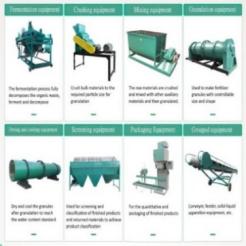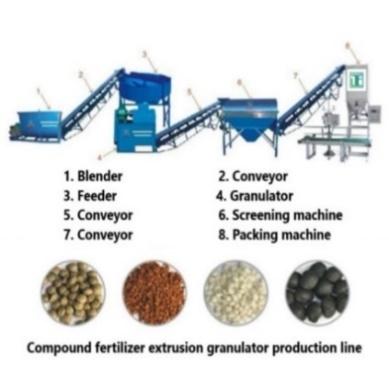Compost processing machine
A compost processing machine is a specialized equipment used in the efficient processing of organic waste materials into nutrient-rich compost. These machines play a vital role in accelerating the decomposition process, ensuring proper aeration, and producing high-quality compost.
In-vessel Composters:
In-vessel composters are enclosed systems that facilitate composting within a controlled environment. These machines often have mixing mechanisms and can handle large volumes of organic waste.
Aerated Static Pile Systems:
Aerated static pile systems involve using blowers or fans to force air through a pile of composting materials. These systems provide continuous aeration, ensuring oxygen supply and promoting decomposition. They are suitable for medium to large-scale composting operations, offering efficient processing of organic waste.
Windrow Turners:
Windrow turners are heavy-duty machines specifically designed for large-scale composting operations. These machines are used to turn, mix, and aerate compost windrows. By lifting and shifting the materials, windrow turners promote proper decomposition and ensure uniform processing throughout the pile.
Compost Sifters:
Compost sifters are machines that help in the separation of larger particles from the finished compost. They have screens or mesh to filter out any remaining organic matter, stones, or debris. Compost sifters are commonly used in the final processing stage to produce refined, fine-textured compost.
Applications:
Compost processing machines find applications in various sectors, including:
Agriculture and Horticulture:
Compost processing machines play a vital role in agriculture and horticulture. The resulting compost enriches the soil, improves nutrient content, and enhances soil structure. It can be used as a natural fertilizer for crop production, landscaping, gardening, and nursery operations.
Land Reclamation and Erosion Control:
Compost processing machines help in the reclamation of degraded land and soil erosion control. The nutrient-rich compost can be applied to eroded areas, mine reclamation sites, or land undergoing restoration to improve soil quality and support plant growth.
Waste Management:
Compost processing machines are essential components of organic waste management systems. They enable the efficient processing and transformation of organic waste into compost, diverting it from landfills. This contributes to reducing the environmental impact of waste and promoting sustainable waste management practices.
Municipal Composting:
Compost processing machines are commonly used in municipal composting facilities to handle the organic fraction of municipal solid waste. These machines ensure efficient decomposition, reduce odors, and produce high-quality compost that can be used in landscaping, urban greening, and soil improvement projects.
Conclusion:
Compost processing machines are valuable tools in the efficient processing of organic waste into nutrient-rich compost. With a variety of types and applications, these machines offer flexibility and versatility for different composting needs. From small-scale home composting to large-scale commercial operations, compost processing machines play a crucial role in sustainable waste management, agriculture, horticulture, and land reclamation practices.







